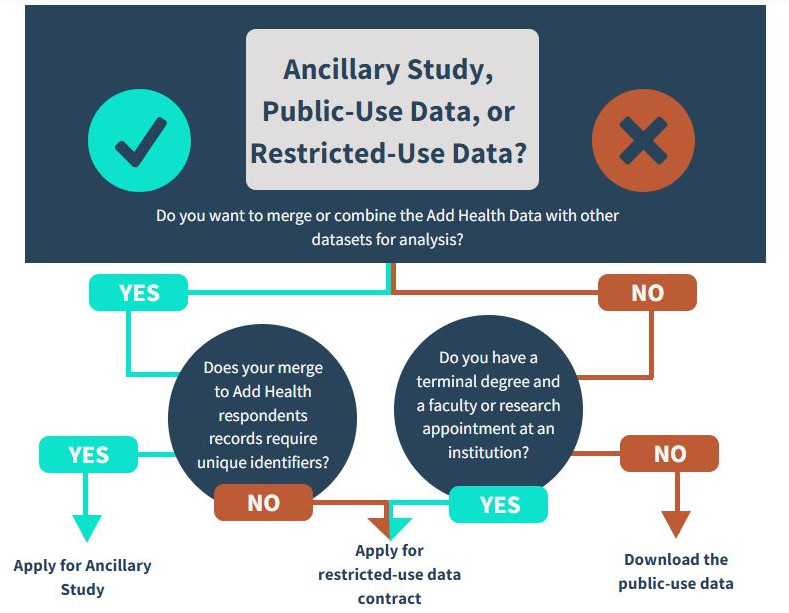Applying for a Contextual Ancillary Study
To gain a more detailed understanding of the application and study process, please refer to the Contextual Ancillary Study Researcher Guidelines. Conducting a contextual ancillary study involves five phases:
Phase 1 – Getting Started
Step 1: Determine if you require an ancillary study or if your research can be conducted with a restricted use data contract. Please use the chart below for assistance.
Step 2: Review the Add Health codebooks for existing datasets to confirm data do not currently exist.
Step 3: Review the completed and in progress Ancillary Studies table to confirm there isn’t an Ancillary Study in progress that will provide the data you can use for your research plans and to ensure there is no significant overlap in concepts.
Step 4: Apply for an ancillary study. Be sure to submit your ancillary study application well in advance of any planned grant proposals (at least 6 months). Add Health Ancillary Study approval should be obtained before any grants including the planned activities are submitted.

Phase 2 – Applying for a Contextual Ancillary Study
1. Submit a brief 1-page Concept Proposal to addhealth_ancillary@unc.edu for Add Health review. Examples are available under the Documents and Resources tab.
2. Address feedback and resolve issues from the preliminary concept proposal review.
3. Submit a Contextual Ancillary Study Application Form for Add Health review. Examples are available under the Documents and Resources tab. Please include the number of variables and a narrative description (12 pages maximum) consisting of:
- Why Add Health?
- Specific Aims
- Brief background and significance
- Conceptual framework and hypotheses
- Data materials requested or to be collected
- Sample size and justification (i.e., formal power calculation)
- Analysis Plan for each aim
4. Receive Add Health review. The outcome of the review may be accept, revise, or reject.
- Accepted applications may move to Phase 3.
- If revisions are requested, they should be made in a resubmitted application form, with tracked changes and comments, along with a response to the changes in a separate document.
- Rejected applications will be provided with a final determination and reason for the decision.
5. Work with the Add Health Studies Coordinator to develop a cost estimate. The Ancillary Investigator must cover all costs incurred by the study such as preparing and documenting analysis files, data merge, codebook creation, and integrating ancillary data into the Add Health Study.
Phase 3 – Obtain funding and complete documentation
Accepted applications will receive a formal written notice, documenting Add Health’s support for the project and guarantee for collaboration. This notice should be included in any external grant application to fund the project.
Once funding has been received, the Ancillary Investigator will be required to complete the following agreements:
- Data and Material Use Agreement.
- If you do not already have a contract in place, apply for a Restricted-Use Contract through the CPC Data Portal.
- Proof of completion of research ethics training by all research team members who will
work with the Add Health data. - Proof of completion of HIPAA training by all research team members who will work with
the Add Health data (if applicable). - IRB approval for the ancillary study.
- Any changes in the scope or procedures of the study must be submitted via a modification form, reviewed, and approved by Add Health.
Phase 4 – Conducting your study
- Schedule your launch meeting – Once your required documents are submitted and funding has been obtained, the Add Health Studies Coordinator will schedule a meeting with the Ancillary Study Investigator’s team and Add Health to discuss your data plans and answer any questions.
- Data set preparation – Assemble the planned contextual variables. Be sure to document data sources, variable construction, and any other relevant details.
- Submit cleaned data file for merge – Add Health will review the data, perform the merge, create a preliminary dataset, and complete a deductive disclosure review.
- Receive preliminary dataset – The preliminary dataset with masked participant IDs will be placed on the secure research workspace (SRW) and the Ancillary Study Investigator will be given 30 days to review the data for errors. If an error is found, Add Health will make the necessary corrections and the Ancillary Study Investigator will be given an additional 30 days to review.
- Prepare documentation – The Add Health Studies Coordinator will provide a User Guide template for the dataset that the Ancillary Study Investigator will need to create.
- Pay invoice – After the preliminary data has been approved, Add Health will conduct a final disclosure review and prepare the data for dissemination. The Add Health Studies Coordinator will submit an invoice at this time for payment. Payment must be received before data can be released.
Phase 5 – Public release of your data
Once approval to disseminate is received from the Ancillary Study Investigator, a tentative release date will be set for the new data. The timeframe for release will be determined by the number of variables included in the ancillary dataset and the availability of Add Health staff to work on the final deductive disclosure risk review. The final data will be released to the entire user community at the same time. The Ancillary Study Investigator can request the data via the CPC Data Portal and begin publishing and presenting on the data.
